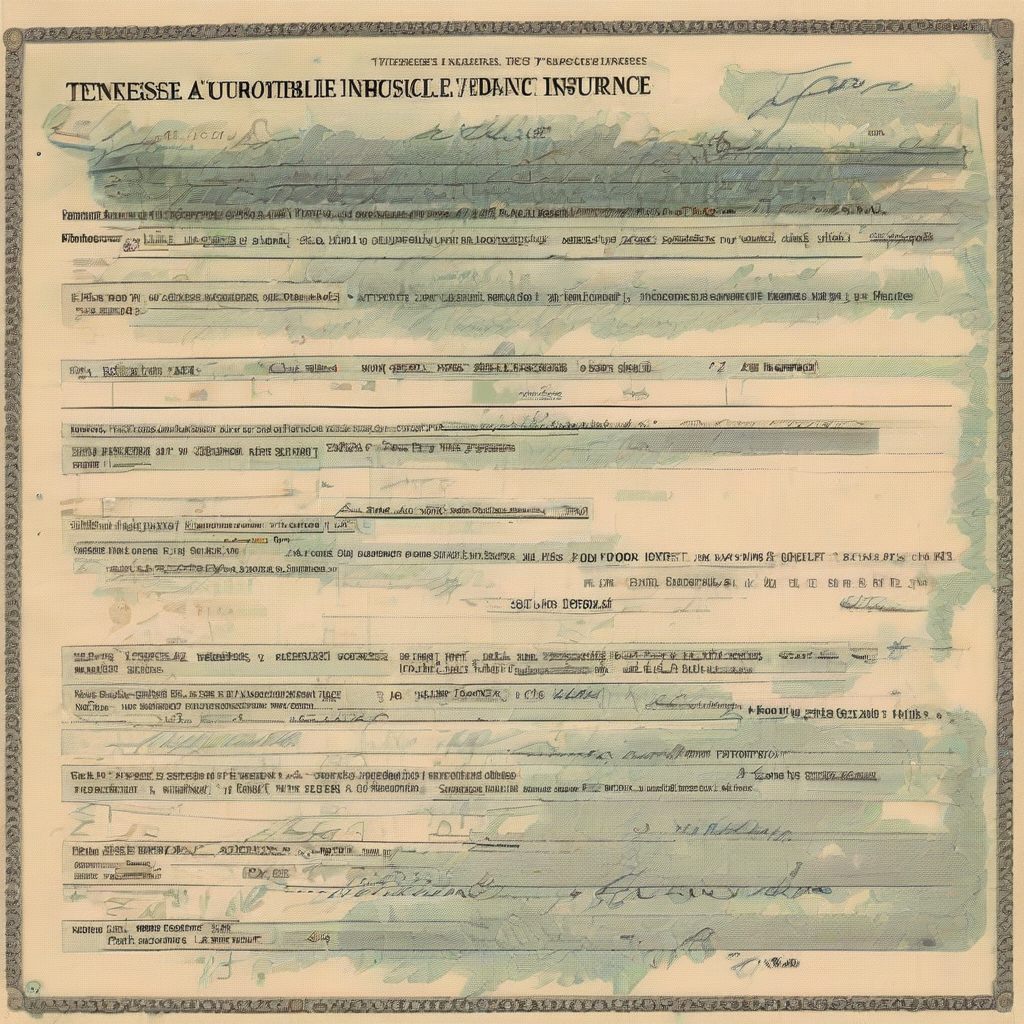
Navigating Tennessee Automobile Insurance: A Comprehensive Guide
Tennessee, like all states, mandates minimum car insurance coverage, creating a complex landscape for drivers. Understanding the nuances of Tennessee automobile insurance is crucial for responsible driving and financial protection. This comprehensive guide explores various aspects of Tennessee car insurance, empowering you to make informed decisions.
Minimum Coverage Requirements in Tennessee
Tennessee’s minimum liability insurance requirements are designed to protect others in case you cause an accident. These minimums don’t necessarily protect you financially. Failing to maintain the required minimums can result in significant penalties, including license suspension and fines.
- Bodily Injury Liability: $25,000 per person/$50,000 per accident. This covers injuries you cause to others in an accident.
- Property Damage Liability: $15,000 per accident. This covers damage you cause to another person’s vehicle or property.
It’s important to understand that these minimums are often insufficient to cover the costs associated with serious accidents. Consider upgrading your coverage to provide better protection for yourself and others.
Types of Car Insurance Coverage in Tennessee
Beyond the minimum requirements, several other types of car insurance coverage are available in Tennessee. Understanding these options helps you tailor your policy to your specific needs and risk tolerance.
- Uninsured/Underinsured Motorist Coverage: Protects you if you’re involved in an accident with an uninsured or underinsured driver. This is highly recommended, given the prevalence of uninsured drivers.
- Collision Coverage: Pays for repairs or replacement of your vehicle if it’s damaged in an accident, regardless of fault. This is often optional but valuable protection.
- Comprehensive Coverage: Covers damage to your vehicle from non-accident events, such as theft, vandalism, fire, or hail. This is optional but protects against a wide range of potential losses.
- Medical Payments Coverage (Med-Pay): Pays for medical expenses for you and your passengers, regardless of fault. This coverage can supplement health insurance.
- Personal Injury Protection (PIP): Covers medical expenses and lost wages for you and your passengers, regardless of fault. Some states mandate PIP; Tennessee does not, but it’s a valuable addition.
Factors Affecting Tennessee Car Insurance Rates
Several factors influence the cost of car insurance in Tennessee. Understanding these factors can help you find the best rates possible.
- Driving Record: Accidents and traffic violations significantly impact your premiums. A clean driving record is essential for lower rates.
- Age and Gender: Younger drivers, particularly males, tend to pay higher premiums due to statistically higher accident rates.
- Vehicle Type: The make, model, and year of your vehicle affect insurance costs. Sports cars and luxury vehicles often have higher premiums.
- Location: Insurance rates vary by geographic location due to differences in accident rates and crime levels.
- Credit Score: In many states, including Tennessee, your credit score can influence your insurance premiums. A good credit score can lead to lower rates.
- Coverage Levels: Higher coverage limits generally result in higher premiums.
- Driving History: Your history of driving, including miles driven annually, can affect your rates.
Finding Affordable Car Insurance in Tennessee
Finding affordable car insurance requires careful comparison shopping and understanding your options.
- Compare Quotes: Obtain quotes from multiple insurance companies to compare prices and coverage options.
- Bundle Policies: Consider bundling your car insurance with other types of insurance, such as homeowners or renters insurance, to potentially receive discounts.
- Maintain a Good Driving Record: A clean driving record is the most significant factor in determining your insurance rates.
- Explore Discounts: Many insurance companies offer discounts for safe driving, good students, and other factors.
- Consider Higher Deductibles: Choosing a higher deductible can lower your premiums, but be sure you can afford the out-of-pocket expense in case of a claim.
- Review Your Coverage Regularly: Your insurance needs may change over time. Regularly review your policy to ensure it still meets your requirements.
Understanding Your Tennessee Car Insurance Policy
Once you’ve chosen a policy, it’s crucial to understand its terms and conditions.
- Policy Declarations Page: This page summarizes your coverage details, including your premiums, coverage limits, and deductibles.
- Policy Provisions: This section outlines the terms and conditions of your policy, including your responsibilities as a policyholder.
- Claims Process: Understand how to file a claim in case of an accident or other covered event. Having a clear understanding of this process will make things easier should you need to file a claim.
Dealing with an Accident in Tennessee
If you’re involved in a car accident in Tennessee, follow these steps:
- Check for Injuries: Prioritize the safety of yourself and others involved. Seek immediate medical attention if necessary.
- Call 911: Report the accident to law enforcement, especially if there are injuries or significant property damage.
- Exchange Information: Exchange information with the other driver(s), including names, addresses, phone numbers, insurance information, and driver’s license numbers.
- Document the Scene: Take photos or videos of the accident scene, including vehicle damage and any visible injuries.
- Contact Your Insurance Company: Report the accident to your insurance company as soon as possible.
- Obtain Medical Attention: Even if you don’t feel injured immediately, seek medical attention to rule out any potential injuries.
Choosing the Right Insurance Company
Selecting the right insurance company is a crucial decision. Consider factors like:
- Financial Stability: Choose a company with a strong financial rating to ensure they can pay claims when needed.
- Customer Service: Look for a company with a reputation for excellent customer service and responsiveness.
- Claims Process: Research the company’s claims process and how efficiently they handle claims.
- Discounts and Bundling Options: Explore available discounts and the possibility of bundling policies for savings.
Understanding SR-22 Insurance in Tennessee
An SR-22 is a certificate of insurance that demonstrates proof of financial responsibility to the state. It’s often required for drivers with serious driving infractions, such as DUI convictions or multiple accidents.
- Purpose: The SR-22 ensures that drivers maintain the minimum liability insurance required by the state.
- Requirements: The requirements for obtaining an SR-22 vary depending on the specific violation and the state’s regulations.
- Cost: SR-22 insurance is typically more expensive than standard car insurance due to the increased risk.
High-Risk Drivers and Insurance in Tennessee
Drivers with poor driving records often face higher insurance premiums. This is because they represent a greater risk to insurance companies.
- DUI Convictions: DUI convictions significantly increase insurance rates.
- Multiple Accidents: A history of multiple accidents leads to higher premiums.
- Traffic Violations: Frequent traffic violations can also result in increased insurance costs.
- Options for High-Risk Drivers: High-risk drivers may need to explore specialized insurance companies that cater to their needs.
The Importance of Adequate Car Insurance
Having adequate car insurance is not just a legal requirement; it’s a crucial financial safeguard. It protects you and others in case of accidents and unexpected events. Understanding the specifics of Tennessee’s car insurance laws and options enables drivers to make informed choices, ensuring both legal compliance and personal financial security.



